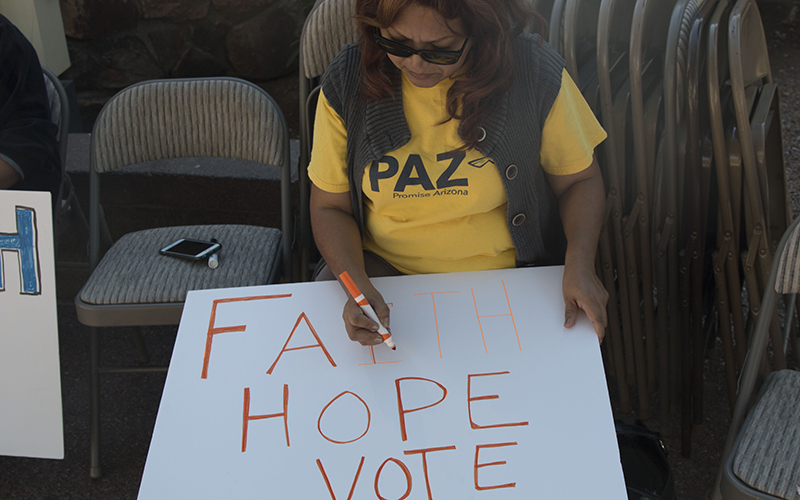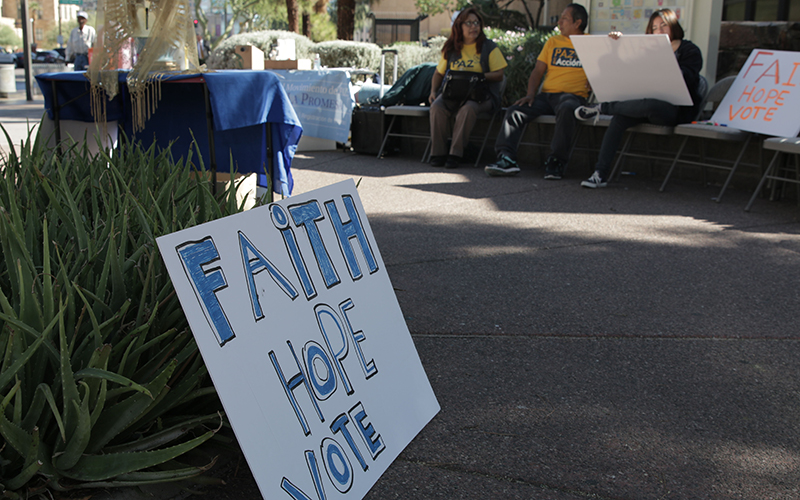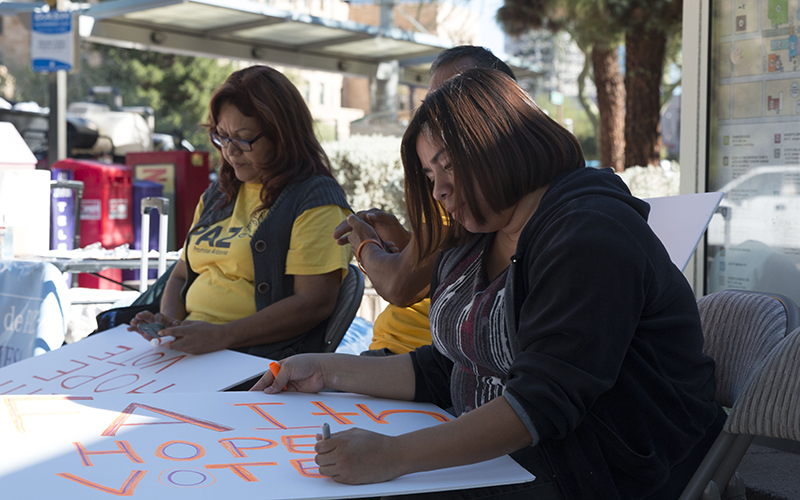
Elvira Guadarrama, 52, volunteers at a vigil in Phoenix against Latino voter suppression in the 2016 election on Nov. 7. (Photo by Courtney Columbus/Cronkite News)

Elvira Guadarrama (left), Gustavo Cruz and Irma Gaytan sit at the Promise Arizona vigil in Phoenix. (Photo by Courtney Columbus/Cronkite News)

Elvira Guadarrama (left), Gustavo Cruz and Irma Gaytan make signs at a vigil against Latino voter suppression in the 2016 election. (Photo by Courtney Columbus/Cronkite News)
PHOENIX — Elvira Guadarrama colored a sign while sitting on a folding chair near the Maricopa County Elections Department.
The sign read: “Faith, Hope, Vote.”
Nearby, a statue of Our Lady of Guadalupe stood on a card table, surrounded by burning candles.
Guadarrama, 52, an administrative assistant, is a volunteer for Promise Arizona. The local non-profit is holding a three-day vigil to stand up against the threat of voter suppression, to spread a message that the election should be about peace and liberty and to counter anti-Latino, anti-immigrant rhetoric.
“I’m tired of discrimination,” Guadarrama said in Spanish. “We [Latinos] have power too, we have the power to vote.”
She worries that some groups who watch polling places may intimidate Latino voters before they cast their votes. And there’s unsubstantiated buzz that some people might show up at the polls carrying weapons to intimidate voters on Nov. 8.
Some voting rights activists worry that a 2013 court decision could make it harder to vote in areas with a history of discrimination at the polls, including Arizona. The Shelby County v. Alabama decision took away additional protections for states, counties and townships that had previously been monitored for voter suppression.
Guadarrama can’t vote. As a permanent resident, she said, she’ll be eligible to apply for citizenship in three years. She sees voting as an obligation and a civil right that everyone should exercise.
The “Faith, Hope, Vote Procession and Vigil” began Sunday with a procession from St. Matthew’s Church in west central Phoenix, and ended at the county elections office. Along the way, participants stopped at 12 polling places and prayed for poll workers and peace on Election Day. Petra Falcon, the executive director of Promise Arizona, says a message of peace and love counters the tension around this election.
James Garcia, spokesman for Promise Arizona, said the organization has a broad mission of community empowerment and promotes issues such as immigration reform.
“Nothing is more empowering than the ability to vote and the freedom to vote,” he said.
Promise Arizona is one of 14 organizations that form the One Arizona coalition. Collectively, the coalition said it has registered 150,000 Latino voters this year.
Since Arizona’s voter registration deadline in mid-October, Promise Arizona has focused on get-out-the-vote efforts, including knocking on doors in South Phoenix, an area with a large Latino population. (About 54 percent of South Phoenix households speak primarily Spanish, according to the South Phoenix Regional Partnership Council.)
Guadarrama said she has also volunteered as a phone banker, and has fielded calls from voters who had problems with their mail-in ballots or who had been asked for additional forms of ID at the polls.
Gustavo Cruz, a 62-year-old undocumented immigrant, stood vigil with Guadarrama. He said he crossed the border illegally from Mexico in search of work 16 years ago, after losing his job at a factory.
“I was over 40, I was obsolete,” he said in Spanish.
He lives in Phoenix and works as a handyman now.
He worries about the impact of the election on immigration reform.
“We are humans first,” he said. “Borders have divided us.”
“Election Day needs to be about peace and liberty and the free exercise of democracy,” Garcia said.
And while there’s fear that some people will be bringing weapons to the polls, Promise Arizona will be bringing prayers, he said.